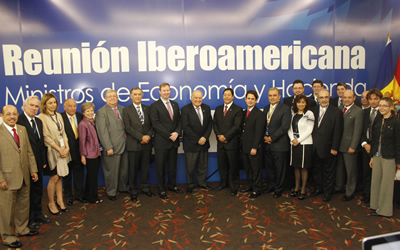ECLAC Calls For a Boost to Structural Change with Equality Based on Innovation, Training and Employment
Topic(s)
Alicia Bárcena took part in the 6th Ibero-American Conference of Ministers of the Economy and Finance in the Central American country.

(27 June 2013) The Executive Secretary of the Economic Commission for Latin America and the Caribbean (ECLAC), Alicia Bárcena, described the risks faced by Latin American economies to regional authorities meeting in Panama City, Panama, and called for a boost to policies that promote innovation, training and employment with rights.
On 26 June, the most senior official of this United Nations regional commission took part in the 6th Ibero-American Conference of Ministers of the Economy and Finance, which is being held as part of preparations for the 23rd Ibero-American Summit of Heads of State and Government, which will take place on 17 and 18 October in Panama under the heading "The political, economic, social and cultural role of the Ibero-American community in the new world context".
Ms. Bárcena said there was a need to renew Latin American regionalism based on production chains that increase intraregional trade and generate new spaces for Latin American integration and cooperation.
Slowing growth in China, the sluggish recovery in the United States and Japan and the Euro zone recession have contributed to lower growth in the region in relation to trade, remittances, tourism and worsening terms of trade.
According to Ms. Bárcena, the tight fiscal policy of developed economies and the gradual withdrawal of monetary stimuli in the United States pose additional risks for the region.
She added that countries have less fiscal room for manoeuvre when it comes to countercyclical policies, but they do have international reserves, low public debt, abundant natural resources and a cumulated capacity for macroeconomic management in times of crisis.
"It is a time for caution, but this does not mean weakening social safety nets or eroding investment in our countries' competitiveness and productive transformation", stated the ECLAC Executive Secretary.
Ms. Bárcena informed the regional authorities of ECLAC's proposed structural change for equality, which aims to link macroeconomic policy with the industrial policy of productive transformation.
The Commission's proposal brings the focus back to investment in infrastructure and tradable sectors, and linking production chains with the network of the region's small and medium-sized enterprises. The proposal also emphasizes the importance of non-contributory universal protection systems and quality education to redistribute the fruits of growth.
In Panama, Alicia Bárcena called for the renewal of political covenants to strengthen trust in institutions and give the State the necessary means to drive structural change for equality in Latin America.
During her stay in the Central American country, the Executive Secretary of ECLAC also met with the Foreign Affairs Minister, Fernando Núñez Fábrega, and held meetings with the regional directors of United Nations agencies in Panama, the Resident Coordinator and other agency directors.
Any queries should be sent to the ECLAC Public Information and Web Services Section.
E-mail: prensa@cepal.org; Telephone: (56 2) 2210 2040.
Follow us on: Twitter, Facebook, Flickr and YouTube
Contact
Public Information Unit
- prensa@cepal.org
- (56 2) 2210 2040